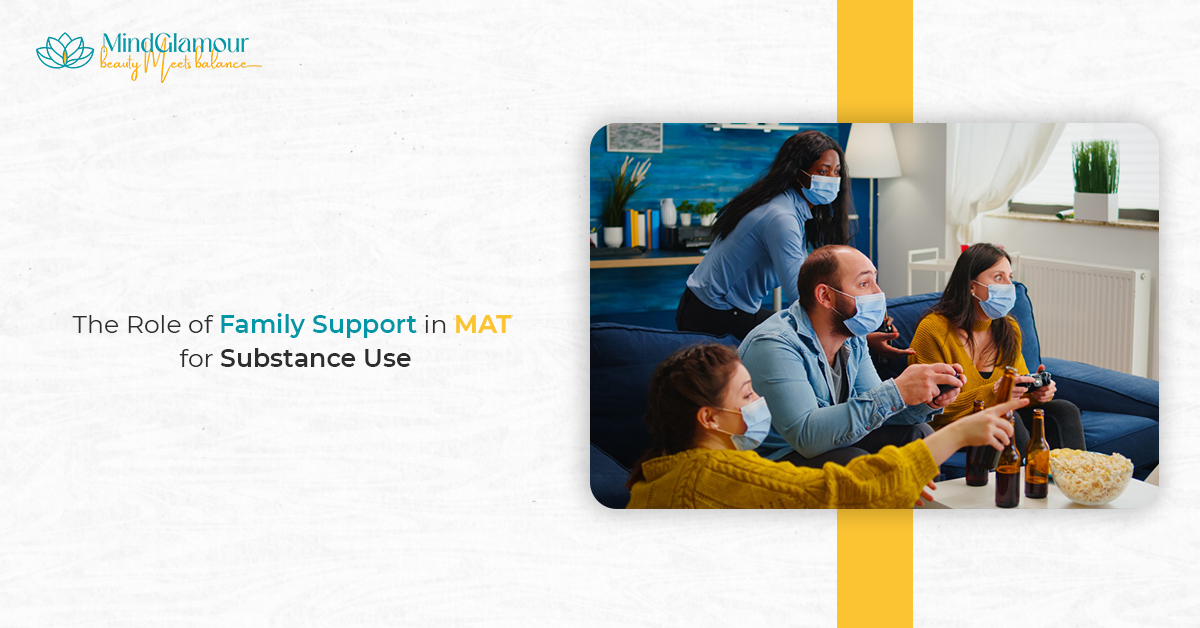Recovering from substance use can be hard. Individuals who use drugs or alcohol can become sick, sad, or even worried. Medication-Assisted Treatment (MAT) helps. It is a combination of medicine and therapy to prevent drug use, improve feelings, and maintain health.
At Mind Glamour PLLC, we provide evidence-based MAT for opioid, alcohol, and nicotine addiction. Our MAT uses medicine and therapy to help people stop cravings and prevent using again.
The role of family support in MAT for substance use is vital. Family can assist in being warm, listening, and attending therapy with them. Their support makes recovery easier.
Let’s learn about how families help.
What Is Medication-Assisted Treatment (MAT)?
MAT is a special kind of treatment for people with addiction. It uses medicine to help with cravings and withdrawal.
Therapy is also included to help people learn new ways to deal with stress and triggers. MAT helps people stay on the path to recovery.
With Mind Glamour PLLC, MAT is tailored for each patient. Our team works with families to ensure everyone understands the treatment and how they can help.
The Role of Family Support in MAT for Substance Use: Why It Matters
Family support can help people in many ways:
- Emotional Support
People in recovery can feel sad or worried. Families can listen, hug, and say kind words. “I am here for you” can make a person feel loved. Mind Glamour PLLC teaches families how to give good emotional support.
- Helping with Treatment
MAT needs patients to take medicine and go to therapy. Families can remind their loved ones gently. This support helps people stay on track and avoid relapse. The Mind Glamour team gives families tips on how to help without pressure.
- Making a Safe Home
A calm and safe home helps recovery. Families can remove triggers like alcohol or drugs and make a peaceful place. Mind Glamour PLLC helps families learn how to create a safe space for their loved ones.
- Celebrating Wins
Recovery has many small wins. All successes are going to therapy, taking medicine, or staying sober for a day. Families can celebrate these. Mind Glamour encourages families to cheer on progress because it boosts confidence.
How Families Can Help in MAT
Families can do many things to support MAT:.
- Learn About MAT
Learning about MAT helps families understand recovery. Medicine is safe and helps with cravings. Therapy helps people cope with stress. Mind Glamour PLLC gives families resources to learn about MAT and help them better.
- Go to Family Therapy
Some MAT programs include family therapy. Families can talk about feelings and learn how to help. Therapy also teaches communication and trust. At Mind Glamour, family therapy is part of the plan.
- Listen Without Judging
Addiction is not a choice. It is an illness. Families can listen kindly without blaming. People in recovery are more likely to succeed when they feel heard. Mind Glamour helps families practice listening in a caring way.
- Support Healthy Habits
Healthy routines help recovery. Families would be able to promote exercise, nutritious food, and sleep. Walking or preparing wholesome food can substitute for bad habits. Mind Glamour PLLC suggests families join patients in healthy activities.
- Be Patient
Recovery can have good days and bad days. Families can remain tolerant and supportive. Constant support makes the patients feel that they are not alone. Mind Glamour teaches families how to be patient and positive.
- Talk Openly
Open conversation helps families understand what the patient needs. Sharing feelings can reduce stress and build trust. Mind Glamour PLLC gives tips on how families can talk in helpful ways.
- Set Boundaries
Assistance should not be to allow a person to do bad things. Families can establish regulations as to what is acceptable and what is not. Boundaries help both the patient and family stay healthy. At Mind Glamour, boundaries are part of recovery planning.
Benefits of Family Support in MAT
Family support has many positive results:
- Better Recovery: Patients with support finish treatment and stay sober.
- Lower Risk of Relapse: Families help reduce the chances of going back to drugs.
- Better Emotions: Support lowers stress, sadness, and worry.
- More Motivation: Knowing someone cares inspires patients to keep going.
- Fixing Relationships: Recovery can help rebuild trust and love in families.
Mind Glamour PLLC focuses on these benefits and helps families understand their essential role.
Challenges Families May Face
Supporting someone in recovery can be hard. Families may feel worried or frustrated.
Sometimes, they may not know how to help. Seeing a loved one struggle can hurt.
Mind Glamour supports families with counseling and tips to handle difficult moments.
Tips for Families
Here are simple ways to help:
- Celebrate small wins. Recovery takes time.
- Use kind words and stay calm.
- Learn about MAT together.
- Encourage healthy habits like sleep, exercise, and eating meals.
- Take care of yourself, too. Self-care helps families stay strong.
- Join support groups if needed.
Mind Glamour PLLC guides families on these tips so they can help in the best way possible.
Key Takeaways
Family support is essential in MAT. Recovery works best when patients feel loved and supported.
Families can help by learning about MAT, listening kindly, encouraging therapy, and making a safe home. Patience, understanding, and care make a big difference.
Mind Glamour PLLC offers evidence-based MAT for opioid, alcohol, and nicotine addiction. We help patients recover and build healthier lives with family support and expert guidance. You can overcome addiction, and we’re here to help. Contact us.
FAQs
Q: Can MAT help with all addictions?
MAT at Mind Glamour PLLC is used for opioid, alcohol, and nicotine addiction. It may not be for other addictions, but therapy and support are always available for different challenges.
Q: How long does MAT last?
It depends on the patient. Some need medicine for a few months, some longer. Therapy and family support continue as required.

